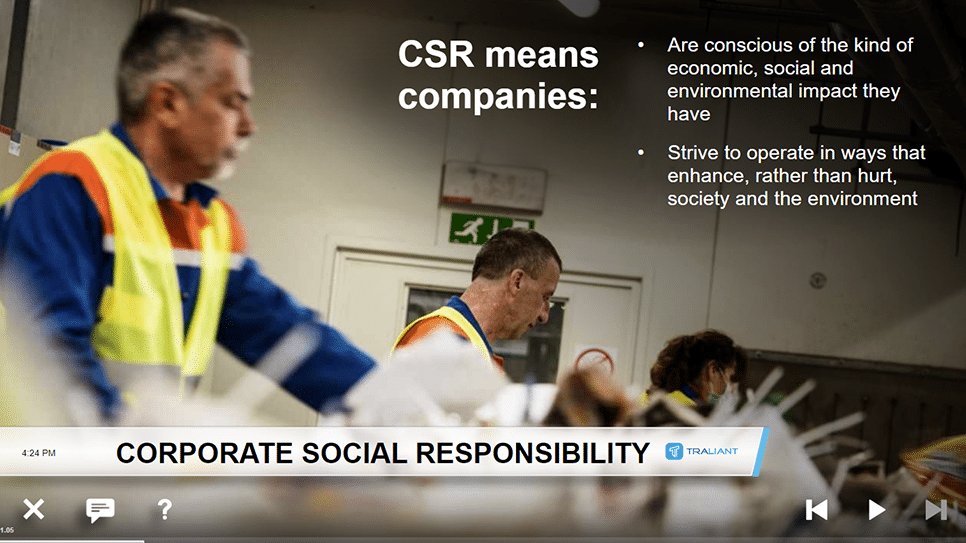
Corporate Social Responsibility Training
Raising awareness of corporate social responsibility can motivate positive changes, inside and outside of the organization
Course description
This 10-minute course introduces managers and employees to the concepts of corporate social responsibility (CSR). Learners gain a better understanding of what CSR is and why it matters to stakeholders and the community. Examples of CSR programs, interactive challenges, viewer email and tweets address common questions and reinforce key concepts.
ONLINE TRAINING
Corporate Social Responsibility Training

The course covers these topics and more:
- What is corporate social responsibility and corporate citizenship
- Why CSR matters
- Key business benefits
- Examples of CSR initiatives
- Practical tips to help support responsible corporate citizenship
KEY FEATURES
Why you'll love our training
It’s time to embrace a new era of online training with a valued partner who will ensure seamless implementation, along with a learning experience your employees will truly enjoy.
Course administration
Traliant makes it simple to roll out training to your workplace and provide technical support directly to your employees at no additional cost.
Course customizations
Tailor courses to include your logo, relevant policies, workplace images, and more. Traliant can even customize the course with scenarios that take place in your own workplace environment.
Translations
Training is available in English, Spanish and is supported in over 100 languages.
What to consider when choosing the most effective corporate social responsibility training

- Promote a culture of ethics and responsibility: CSR training helps to create a workplace where employees are aware of the company's values and are committed to ethical business practices.
- Enhance the organization's reputation: Companies that are seen as socially responsible are more likely to attract and retain customers, employees, and investors.
- Improve stakeholder engagement: Training helps to engage stakeholders in the company's CSR efforts.
- Empower employees: Training provides employees with the knowledge and skills they need to understand the company's CSR commitments and to make informed decisions about their work.
- Strengthen your organization's commitment to social responsibility: Training demonstrates the company's commitment to ethical business practices and to contributing to society.
- Increase employee engagement: Employees who are aware of the company's CSR initiatives and who feel involved in them are more likely to be engaged in their work.
- Environmental responsibility: Protecting the environment and reducing the company's environmental impact.
- Social responsibility: Treating employees fairly, respecting human rights, and contributing to the community.
- Ethical behavior: Conducting business ethically and with integrity.
- Environmental sustainability: Reducing carbon emissions, using renewable energy, and implementing recycling programs.
- Social responsibility: Providing fair wages and benefits, promoting diversity and inclusion, and supporting community organizations.
- Ethical sourcing: Sourcing products and materials from companies that operate ethically and sustainably.
- Volunteer for a company-sponsored volunteer event.
- Support the company's sustainability initiatives, such as recycling and waste reduction programs.
- Share information about CSR with customers, clients, and other stakeholders.
- Be an advocate for ethical behavior in the workplace.






